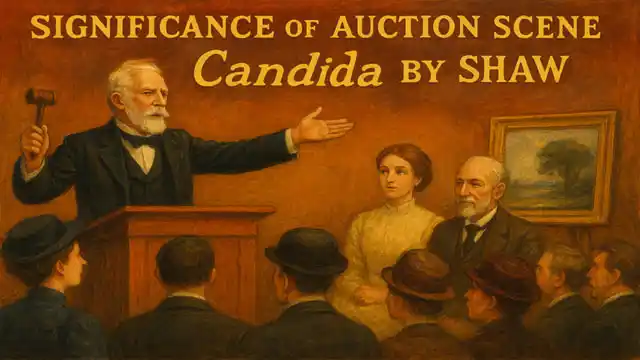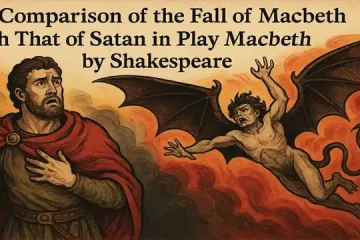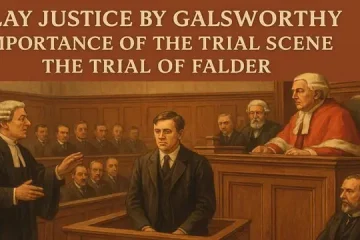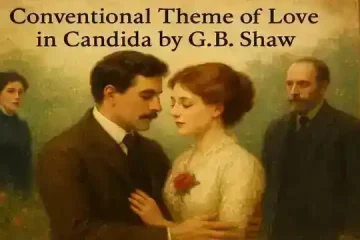Introduction of Auction Scene:
In George Bernard Shaw’s play Candida, the famous “auction scene” in Act III stands as the dramatic and thematic climax of the work. Far from being a mere comic interlude, this scene serves as a powerful device through which Shaw reveals the deeper complexities of love, marriage, and human relationships.
By presenting Candida as the object of a symbolic “auction” between her husband, Reverend James Morell, and the young poet, Eugene Marchbanks, Shaw cleverly subverts traditional notions of romantic choice and female dependence. Instead, he emphasizes Candida’s autonomy, intelligence, and authority in determining her own destiny. The auction scene not only sharpens the contrast between the two male characters but also highlights Shaw’s critique of conventional Victorian ideals of love and marriage, making it central to the play’s social and moral message.
Auction Scene and its Reason of Calling it so:
Morell comes back to his house and Candida becomes busy in cooking food. He entertains the doubts about the purity and goodness of his wife. He becomes extremely eager to know what has happened between his wife and the poet, Eugene, in his absence. Marchbanks tells him that in his absence he has behaved with Candida like an honourable person. He means to say that he has not enjoyed her physically. According to him, Candida possesses divine qualities which make her so broad – minded that she does not care for the follies of Eugene and Morell. Morell tries to recover his position; so he says that there are moments of the greatest happiness in man’s life. It was during one such moment that he asked for Candida’s love and got it.
When Morell asked Eugene what happened during his absence. Eugene admits that he has enjoyed the heavenly pleasure but it is Morell who has disturbed him. Eugene suggests to Morell that both of them are unfit for Candida and, therefore, both of them should leave the house in search of a worthy lover for her. When Candida enters the room, she finds her husband in a dejected mood. She scolds Eugene and tells him how he is responsible for the miseries of her husband. Being irritated, Eugene decides to leave the house at the very moment. But he is stopped by Candida.
Morell admits before Eugene that Candida is his greatest treasure, this shows his doubt whether she is his or not. When Morell asks Candida whether se fates him and loves Eugene as said by Eugene, Eugene does not admit it. Morell asks Candida to choose between himself and the poet. These tense and dramatic incidents take place in the later half of the Act III of Candida, which is generally known as the ‘auction – scene’. The proposal of Morell offends Candida and she angrily asks:
“Oh, I am to choose, am I? I suppose it is quite settled that I must belong to one or the other.”
It means that she is up for auction, so she ironically calls him, “her lords and masters” and asks them what they have to offer for her, what are their bids for her. In the rest of the scene, Morell offers her complete protection in everything. Eugene desires her protection in his weakness and unhappiness. Candida says that she will choose the weaker of the two. She argues that whereas Eugene has led unhappy life, Morell has led a happy life. Candida opines that Morell’s pleasure at present depends on her. She plays the role of wife, mother and sister in his life. She further says that if she leaves Morell, his happiness will be ruined, while Eugene knows the art of leading an unpleasant life. In this way Candida gives herself to Morell.
The Scene Representing the Climax of the Play:
The auction scene represents the crises or climax of the play. Everything that has happened till now leads upto this scene and what follows is the denouement of this climatic scene. Candida’s choice is significant because it shows her character, as well as throws light on the personalities of Morell and Marchbanks. This scene provides solution to the problem of love – triangle. The play does not end in the conventional manner with the wife walking out with the lover, but with the wife choosing to stay on with the husband.
Eugene’s Shocking Morell by Expressing His Love in Act I:
In Act 1: Marchbanks very frankly tells Morell that he loves Candida. To hear these unexpected words from Eugene, Morell is profoundly shocked. But he soon recovers and does not take this thing seriously as there is much difference between the ages of the two. He says that his love is ‘calf love’. But Morell becomes sure that the poet really loves his wife. When Eugene remarks that his sermons are mere words, empty nothings, and that he is blindly and selfishly sacrificing her to minister to his sense of self – sufficiency and that her life with him is intolerable, Morell tries to silence him by pointing out that he is making a great fool of himself, for she likes that life pretty well. Eugene replies sarcastically:
“Oh, do you think I don’t know all that? Do you think that the things people make fools of themselves about are any less real and true than the things they behave sensibly about … They are more true: they are the only things that are true. You are very calm and sensible and moderate with me because you can see that I am a fool about your wife: just as no doubt that old man who was here just now is very wise over your Socialism; because he sees that you are a fool about it … Does that prove you wrong? Does you complacent superiority to me prove that I am wrong?”
Candida becomes an apple of discord between Eugene and Morell. Eugene tells him that he has treated his wife like a slave all these years. He has used her as a means to his pleasure and advantage. Their personalities are so different. Not even one thought is common between them. This piercing sarcasm shatters Morell’s confidence. Morell calls him fool. He thinks that some devil is putting words in his mouth:
“Marchbanks: some devil is putting these words into your mouth. It is easy – terribly easy – to shake a man’s faith in himself. To take advantage of that to break a man’s spirit is devil’s work. Take care of what you are doing. Take care.”
Morell begins to feel his own weakness and the fear seizes him that perhaps the poet is right, and that while he was rousing the meeting to enthusiasm by his emotional oratory his wife may have despised him in her heart. Morell consoles Marchbanks:
“And last, but trust me, not least, I will help you to believe that your wife loves you can is happy in her home. We need such help, Marchbanks: we need it greatly and always. There are so many things to make us doubt, if once we let our understanding be troubled. Even at home, we sit as if in camps, encompassed by a hostile army of doubts. Will you play the traitor and let them in one me?”
Eugene Marchbanks pursues his arguments relentlessly without feeling any sense of defeat in Morell’s attack. He remarks that Morell feeds his wife on mere metaphors and sermons and further adds:
“I have never been in your church: I have been to your political meetings: and I have seen you do what is called rousing the meeting to enthusiasm: that is, you excited them until they behaved exactly as if they were drunk. And their wives looked on and saw what fools they were. Oh, it’s an old story – you’ll find it in the Bible. I imagine King David, in his fits of enthusiasm, was very like you. (Stabbing him with the words) But his wife despised him in her heart.”
Morell finds himself unable to control his anger. He catches hold of Eugene. But then he leaves the poet and asks him to leave the house. Physically Eugene may be weak, but intellectually he is superior to Morell. He replies that he is not a coward, though he has no physical courage. He will fight Morell’s ideas. He will rescue Candida from them:
“I am not afraid of a clergyman’s ideas. I’ll fight your ideas. I will rescue her from her slavery to them. You are driving me out of the house because you daren’t let her choose between your ideas and mine. You are afraid to let me see her again.”
Next, Candida’s Shattering Morell’s Confidence:
In Act II, the play goes on slowly towards the climax. In this Act, we get a very clear picture of Eugene’s idea and ideal of love. A poet as he is, he creates a world of his own. There he wants to go with his lady – love, Candida in a shallop or a chariot. The things of the physical world seem to mar her loveliness. In this Act, Candida very boldly and firmly expresses her views about Morell and Eugene. She makes no secret of the fact that Eugene is ready to fall madly in love with her. She would have done the same thing, had Morell’s love not stood in her way. She would have given even her goodness and purity to enjoy Eugene’s love. Morell is shocked by her solicitude for the young poet and her idea that she should have taught him what love really is. Her words are thunderbolt to him:
“Oh, James how little you understand me, to talk of your confidence in my goodness and purity. I would give them both to poor Eugene as willingly as I would give my shawl to a beggar dying of cold, if there were nothing else to restrain me. Put your trust in my love for you, James; for it that went, I should care very little for your sermons.”
She also tells her husband that all the people are in love with him because he preaches in such in excellent manner. And people come to his meetings, not because they are prompted by some religious feelings, but because they want to entertain and amuse themselves. She also points out that all his sermons and talks are mere words of no good to any one:
“They think they agree with you; but what’s the use of their agreeing with you if they go and do just the opposite of what you tell them the moment your back is turned? Look at our congregation at St Dominic’s! Why do they come to hear you talking about Christianity every Sunday? Why, just because they’ve been so full of business and money – making for six days that they want to forget all about it and have a rest on the seventh; so that they can go back fresh and make money harder than ever! You positively help them at it instead of hindering them.”
Shattering of Morell’s Illusions and His Responding at Candida’s Words:
Candida again asks him as to why women are so enthusiastic about him and his sermons. They come to look at him, for they all are in love with him. He is wrong if he thinks that women are enthusiastic for the Kingdom of Heaven on earth. A consulsive moment shakes Morell and he otters as if in a wild dream:
“Candida what dreadful! What soul – destroying cynicism!”
In this way all Morell’s illusions regarding his own importance, the values of his sermons, and talks; and the love of his wife for him and his happy married life, are all shattered one by one. His frenzied mind started seeking frantically a solution to the situation that has now become intolerable to him.
Introducing or the Approach of Auction Scene:
Eugene Marchbanks refuses to accept the explanation of Morell’s. But when he realises that Candida is more than a match for both of them, he tells Morell:
“Morell, let us both give, her up. Why should she have to choose between a wretched little nervous disease like me, and a pig – headed parson like you? Let us go on a pilgrimage, you to the east and I to the west, in search of a worthy lover for her: some beautiful archangel with purple wings …”
That is when Candida, self – possessed as ever, realises that things have gone too far. She feels that she is up for auction, and she asks her husband and her lover to bid for her: This is a position in which any ordinary woman would have easily lost her mental balance and she might have been supported one against the other, and in so doing committed a mistake in her choice. But Candida is that type of woman who keeps herself in complete command of the situation and with bitter sarcasm makes them ashamed of themselves. She asks her husband and her lover to bid for her. Morell, down – to – earth as he is, says:
“I have nothing to offer you but my strength for your defence, my honesty for four livelihood, and ability and industry for your dignity. That is all it becomes a man to offer a woman.”
In this way when each of them bids for her, she chooses the weaker of the two, and thus she makes each one of them feel that he is worse than the other.
It is Marchbanks who is able to understand quickly that she has chosen Morell. Then she makes them sit near her and she speaks to them like a mother scolding her children for their misbehaviour and misdeeds. She indicates the difference in their early life, upbringing and their qualities. And through such a narration she is able to make them understand why she chose Morell who has the need for help and guidance of someone. Thus she is able to make Morell understand that much of his strength comes from her. She also convinces Marchbanks that what he wants in life is not domestic felicity as Morell’s but a life of freedom in the middle of nature, as is felt by every poet. Thus even in making them ashamed of their actions she is gentle and persuasive.
Candida’s Turning Out to be the Most Mature and Practical Character:
In this scene, which is central to the play, Candida is obviously enjoying the situation and the predicament both Morell and Eugene Marchbanks who have been fighting over her like children in her absence. She turns out to be the most mature and practical character in the play named after her. Eventually she chooses the weaker of the two – her husband and Morell. She believes that Eugene Marchbanks, as he marches into the night, will live and learn, but Morell can’t do without her love and ministrations:
“I build a castle of comfort and indulgence and love for him, and stand sentinel always to keep little vulgar cares out. I make him master here, though he does not know it, and could not tell you a moment ago how it came to be so.”
Shaw’s Giving Importance to Marriage and Family:
Shaw was an anti-romantic. In Candida romantic love is shown to be illusory and destructive, the limitations of human condition are recognised, and the value of the institution, of family and marriage is emphasised. There is only one thing that is fundamental and it is the instinct for betterment. This is the only essential thing. Rest is not only inessential but is also grossly irrational. Complete liberation from the ‘Shackles of marriage and family’, as the romantics desire, would mean only dislodger and chaos and hence it is no solution to human predicament.
Shaw’s Showing Mastery over Stagecraft and the Development of the Three Main Personalities:
The auction scene is theatrically highly effective. This proves Shaw’s mastery over stagecraft. This is the climax of the play and the climax has been gradually built up and the suspense is skilfully kept up. The play ends on a note of mystery.
The auction scene develops the character of three main personalities of the play. In this scene Marchbanks proves himself to be better than Morell in the possession of the quality of getting the better of the other in argument. Besides, he succeeds in keeping the other always in suspense and feels happy in the uncertainty of the other. But he does not amuse himself over the suffering of the other, because from the very moment he realised that some of his remarks of Candida had made Morell suffer, Marchbanks claims that he is a friend of the parson. Marchbanks’ poetic and spiritual qualities are also revealed in the last act.
Great importance must be attached in this scene to the way in which Candida manages to maintain peace between the two men and at the same time makes them understand the foolishness of their action. Candida convinces Marchbanks that a life of domestic felicity would be unbearable to him and so he quietly and with dignity, retires from the stage.
At the same time she is able to show to Morell tactfully that he is not as strong as he had believed himself to be. He is emotionally dependent on Candida. By a bit of commonsense she makes them see reason both are made to realise their defects. From the view point of the plot development the climax is reached when the two men decide to auction her and the problem is resolved again through the wisdom of Candida.




